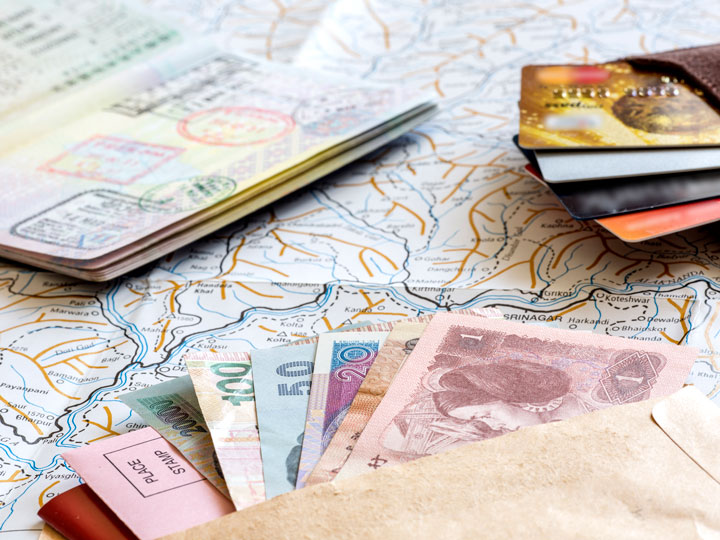Moving abroad is a major life event for anyone who is brave enough–and lucky enough–to take the leap. While being an expat is exciting, fun, and eventful, it can also be challenging. From making friends to figuring out where to buy groceries, the difficulties of living in a foreign country can feel insurmountable at times.

Behind the lens of social media and the interesting lifestyle, being an expat can be just plain hard. Here are some of the typical challenges faced by expatriates along with some tips that make moving abroad a little easier.
RELATED: Ultimate Moving Abroad Packing Checklist
This post contains affiliate links. As an Amazon Associate, I earn from qualifying purchases. For more information, click here.
Fitting in as an expat
In life, it’s never great to feel out of place. Living in a different culture has a way of making you feel that way almost all the time.
For new expats, it’s important to enter the experience of moving abroad with an open mind. Knowing that there are more ways of life than the one that you’re used to in your native country will make the journey much easier for you. If you want a label for this mindset, it’s called cultural intelligence, and it can be as difficult to master as learning a new language.
The biggest thing to keep in mind is that the feeling of not fitting in is common, temporary, and can be overcome with a little work. The first 30 days as an expat can be a whirlwind of emotion and frustration, but things slowly fall into place.
Make a point to attend some cultural events in your new country. You can even learn a lot about the culture by simply watching television (probably with subtitles at first). Introduce yourself to your neighbors and invite them for a cup of coffee. These things will all give you some insight into the local culture and will help ease the feeling of not fitting in.
Making friends

Getting to know new people in your new country is extremely important. It can be tough for expats to make friends, especially in locations that lack an expat community. However, remaining isolated is not an option, and is a surefire way to make your experience miserable.
To meet new people abroad, use every resource possible. This includes searching for meet-up groups online, researching the expat community and finding expat events online. There are even Facebook groups that cater to the expat community.
The key thing is to put yourself out there. Like most things in life, the more you put into making friends, the more you will get out of it. Joining clubs, sports or volunteering will also expand your social network.
Save me for later!
The language barrier
While technology can help make language less of a barrier, a lack of fluency adds additional challenges to living in a foreign country.
Soon-to-be expats should add learning basic phrases to their moving abroad checklist. A bit of effort will make a good impression on locals and help you to meet new people. If possible, sign up for language classes – it’s not only helpful for linguistic learning, but also a great way to meet new people.
Friends from language class will also be just like you – living in a new country where they have a small social circle and don’t speak the native language. If they’re not available, consider finding online lessons for distance learning.
When in doubt, remember this beautiful living abroad quote:
Everyone smiles in the same language.
– George Carlin
Distance from home

It goes without saying that expats can struggle with being far from friends and family. Keeping in touch with loved ones is vital for your mental health and success living abroad. The challenge can be finding time to stay in contact and dealing with different time zones.
Make a point to schedule regular conversations with your loved ones and learn the time difference. Luckily, technology can help with this. Setting a regular time for a skype session or phone call will ease the distance and make for a better transition to life abroad.
Culture shock
Dealing with culture shock is one of the most common difficulties of living in a foreign country. It happens to most expats, and creeps in as the excitement of arriving to your new home country fades and reality sinks in. It’s hard to understand when it’s happening to you, and culture shock affects each person differently.
The experience of moving abroad can be intense and frustrating. You forget how much you take knowing how to do everyday tasks for granted. In your native country, you just know things – how to mail a package, what your oven settings are, how to open a bank account…
In an expat situation, you’re suddenly confused by the easiest tasks and the frustration can sink in as you navigate the new culture.
Culture shock will inevitably pass. But it’s important to monitor your stress levels and support the members of your family who are dealing with the same things.
Family and relationship strain
Relocating abroad is, of course, made better by having your partner or family with you for the ride. However, it can also complicate matters.
Not everyone adjusts the same way or faces the same struggles of moving to a new country. If one person in a relationship follows along and is not working, things get tough. One of you will be experiencing professional highs while the other may be feeling distraught with a lack of job opportunity and no professional network.
Children can also make things difficult as they have their own adjustments with new schools and making friends. For them, it can be even tougher because their classmates are less likely to be bilingual than your colleagues and adults you encounter.
It’s crucial that you communicate as a family or a couple. Talk to each other and check in. Even a daily conversation in the first month after moving abroad is a good idea.
You can’t express your feelings too much as an expat, especially because you will have a lot of them. The lows are lower, and the highs are higher, so make sure you have an emotional release. Watch for signs of expat depression and learn how to manage it if needed.
Getting overwhelmed with living abroad challenges

When you first move abroad, so many things happen at once. You or your partner are usually starting a new job, you may need to find a place to live, there are all kinds of forms and paperwork to file–it gets overwhelming.
It’s important to take these living abroad challenges one day at a time. Start with the things that will make you the most comfortable, and know that it’s okay if you don’t do everything in one week.
Maybe the most important thing to you is to have a normal family meal. After you figure out where to buy groceries, you can learn how to use your appliances. Then set up your dining room and kitchen before you take on the rest of the house at your own pace. The rest will happen and you’ll feel more in control.
Adjusting to work in a new country
Getting used to work seems like a small hurdle, but it’s an oft-overlooked challenge of moving to a new country. While most post people have changed jobs or relocated to a new store/office/factory in their career, it’s usually within the same country or even the same town.
Expats have to adjust to working in an unfamiliar culture. The cultural differences and norms in the workplace are as significant as the changes in language, food, and dress around the world. They require respect and some extra work to adapt to the workplace.
Make sure you’re flexible and open-minded in your new professional life and personal life as an expat.
Managing your money abroad
One of the most common questions new expats ask is how to move money between bank accounts without paying a fortune in exchange fees. Luckily, there’s an easy and cheap solution:
Wise (formerly TransferWise) comes in handy all the time, whether its making a rental deposit or moving funds to cover student loan payments. And it’s way cheaper and faster than doing an international wire transfer from a traditional bank.
If you get paid in multiple currencies (hello digital nomads!), the Wise Multi Currency Account will let you send and receive money in over different 40 currencies. It even comes with a multi-currency debit card.
Open a Wise account today to get real exchange rates, speedy transfers, and ultra-low fees.
Feeling unsettled

One of the biggest complaints of expats is the feeling of being unsettled. While some people move abroad because they don’t want to be tied down, others relish normalcy after some time of being abroad.
Many expats begin their life abroad on a specific contract, and when that contract ends, they need to make another move. When your living situation and visa are tied to temporary employment, it makes it difficult to plan for the future.
If this is the case, the best thing you can do is firmly decide to make the most of the situation. Creating new ties to your new country makes living life with a little ambiguity bearable. Enjoy the time you have rather than worry about when it will end.
No matter what, living abroad is an incredible opportunity. While it’s not for everyone, it’s something you should be proud of and enjoy. And remember: these difficulties of living in a foreign country are all easy to overcome, and none of them last forever.

Derek & Mike
Owners of Robe Trotting
Derek and Mike are an American couple from Philadelphia who moved to Copenhagen in 2017. Since then, they’ve fully embraced the life of living abroad and traveling the world as much as possible. With 40+ countries together, they’ve started their own travel website, Robe Trotting, and another site, Everything Copenhagen, dedicated to showing people their new city.

Want more travel + relocation tips?
Become a member of my Patreon group for exclusive access to my resource library, including:
- Printable packing lists for moving + travel
- Money-saving tips
- Insider travel guides
- And much more




Hi, i m Sofia i dont know anyone person what live in a foreing country but i think the bigest problem for the people in others countrys is the new life a new house a new work and the most horrible make new friends(for my) y more dificult in other lenguage for my this persons are very brave.
I hope I can do it some day and be very brave!
You’re right! When everything is new and different, it is easy to feel afraid. But you will be surprised at your own bravery when you move to a foreign country 🙂 Doing scary things makes us stronger.
I think living abroad is a great opportunity for everyone as they experience and live many things that will serve you in life, form home to school is totally different form what you lived before, you’ll experience cultural clashes that might make you miss food, people, your land, but instead you will know new cultures, customs and traditions. In your professional life you will be able to achieve bigger goals, your dreams will be more ambitious, and what you through impossible maybe possible if you work hard.
Well said, Abril! This is exactly why I encourage people to live abroad.
Problems living abroad
The main problem that I think a person has when living abroad is communication because if you are going to live in a new place there will be situations in which you do not understand anything or use phrases incorrectly and this may cause them to make fun of you but it is completely normal to be wrong, in fact, there will be days when you will feel that nobody understands you, which is really frustrating
Yes, not being able to communicate your thoughts and feelings clearly is a big challenge! It’s one of the hardest things about living in a country that doesn’t speak your language. Thankfully, the more you practice talking, the better it gets. You just need to push through the difficult months of not being understood and know it will get easier.
I meet a person who live in other state of republic, he present difficulties with homesickness, he is very sad because he can’t see his family and his girlfriend, he went to other site to work. He felt like a newcomer, and he don’t know some things about the state. I think people must be travel around of his country and others of the world. Is sad, is probably have a lot of difficulties but the experience will be beautiful and unforgettable.
Homesickness and feeling like an outsider are both challenges everyone will face when living abroad. It’s hard to find happiness when you feel lonely and alone. It helps to focus on what you love about your new home. I hope your friend is able to connect with people in his new state.
The problems that people living abroad could have could be that first, that if they are living in a country that does not speak the same language as them, it could be a problem if you know how to communicate in another way.
Another problem that arises could be money, since when changing money to the currency of the country where it could be less or more than the amount they give you.
Yes, I agree! People do not always think about the exchange rate when moving abroad. It can be a struggle to pay for things like rent deposits if your currency isn’t worth as much in the new country.
The truth is that if it is difficult, living abroad, after having lived a long time in your hometown, and let’s say you do not speak the language, that I think would be the biggest complication someone would have when traveling abroad, on the other hand, if You already speak the language you would not have so much problem, but there are more things that would be difficult for you, for example, from what I have seen people are not so friendly in the United States, of course there are people who are kind, but let’s say that in your environment social, there are people not so friendly, I think that thanks to them there will be a problem, since you will not feel as comfortable in your environment, besides that making friends should not be so easy.
and one of the big factors is that there is still a lot of racism and discrimination over there, therefore it is very likely that as a visitor, you will not be treated so well.
well that’s what I think, by the way I like your blog.
I’m so sorry you have had a bad experience in the US. You are right that in some communities, people are not welcoming to outsiders. It’s especially hard if you don’t speak English fluently. But I promise that many places in the US are very friendly and welcoming! It’s strange to think how America was a country full of immigrants less than 100 years ago, and now it’s much harder to move there or find acceptance…
Traveling abroad gives you lots of opportunities, like learning a language, knowing about the culture of that place, meeting new people among others, has many benefits, but also has disadvantages, and traveling is not bad, I mean that already being in the country, probably and don’t know what you do, and if you don’t know the language, don’t know how to communicate, maybe you feel a little insecure about where you go
I have a friend who is from the United States and because of his father’s work issues, he had problems making friends at school and understanding class topics, he had problems with the schedule and I think the biggest problem he had was moving around the city since it did not know where the places were and it got lost as well as I have big problems with food because in Mexico the food is stormy, I consider these to be two big problems.
My opinion of this situation is that some people who live abroad may be having difficulties because they do not have a permanent job or they were fired, but most are well and they are experiencing the pandemic a little normal I know someone who lives abroad and he told me that only his father’s salary was lowered and he did not work for like 2 months but he is already working normally.
I think that the main problems of a person when going abroad is communication, if he does not know how to express himself in the language spoken in that country it would be quite difficult. The culture shock also, in some countries they are not as affective as in others therefore only being uncomfortable when someone is affective.
Discrimination is an important point, there are countries where they have a negative concept about the people of a country when they see someone from that country in theirs is unpleasant and there is usually discrimination against people
I think that living abroad is difficult at first because you do not know anything about that country, for example the streets, buildings, its customs and maybe the language or understanding is difficult because sometimes some things that you do are prohibited or seen rare in another country or they can even take it as an offense, I think it is difficult for some people to make friends there, they will also see different foods but I think that after a while it will be simple because you got used to it and it will be very cool live in another country.
I am María Fernanda and I believe that living abroad has challenges that little by little will become easy for you, but the problems that I think are the most complicated are moving alone, because you do not yet know the closest streets or places to go When you make friends because you are not going to get friends from one day to the next, you are going to meet people but more at work or school, also the language, since maybe your pronunciation is different, or you get the wrong word,that’s what I consider when you go abroad.
Hello, my name is Andrea, and if I think that there are many problems when moving to another country, since maybe you don’t know someone to help you locate within the city, or maybe you still don’t have a good command of the language, maybe make it difficult for you to adapt to the schedules of that country, or to its customs
I do not know anyone who has had difficulties, but I do know people who dated for a long period of time and did not have any difficulties
I think there are many difficulties when deciding to live in a foreign country since we totally change our habits, and sometimes this process is very difficult; a change in schedule, a different diet, a new job, making friends, getting to know the new place where we live, are activities that we must exchange. Currently I do not know anyone who has gone to another country to live, but I suppose that if a change from city to another is difficult, the change from one country to another would be a difficulty by 10.
I think the biggest problema person can have when living abroad is the language because this influences several factors such as not being able to communicate well with other people and not being able to get a job.
My uncle is thirty-eight years old and is a systems engineer so he has a good job and salary, he works abroad and can speak English very well, but despite this his biggest problem living abroad is that some people discriminate against him because he is from Mexico.
I remember one time he told me that when he went to a restaurant with some friends a person told him to leave because he was Mexican.
i think it´s hard for people living abroad because they don´t know the language, they should get a place to live but in some countries it can be expensive and that makes it difficult.
i have uncles who decided to go to study in the united states but without knowing the lenguage, they started working with small jobs, as janitors, they were good luck to meet people who spoke spanish, now live with their family in america and have a good economy
Hello, good evening, in my opinion, there are many difficulties living abroad, one of them would be the difficulty of speaking a language other than the mother tongue, economic problems and the fact of adapting to a different custom, different people and places different.
One of my aunts lives abroad, more precisely in Canada, and her main problems were communication and getting away from her family and friends. From time to time she travels to Mexico and says that it is more comfortable for her to be here.
I have many relatives who live abroad, their biggest conflict is money, how are they going to get it, I clarify, they are all legal but due to migration problems there are fewer and fewer jobs for those who live there, mainly for one reason another would be the language barrier but they have already lived there for almost more than a decade
The biggest problems that a person can have while abroad are is that you do not know anyone in that country and if you have a problem you will not know who to ask for help because you do not know their language, that the language also in one of the great problems being abroad. Another of the most common problems being abroad is that you do not know the names or the location of the streets and it is very likely that a person being abroad could get lost, but for that I can use the application called Google Maps.
going to live abroad is common, but it is still very problematic. Having to adapt to a new place, culture and traditions is, although we can call it that, the easiest part of all this; but this is not always the case, you can also find racism and other kinds of contempt for yourself. Although this is only what someone who goes abroad correctly lives; Migrants suffer daily from dangers and racism, it is more difficult for them to find a good job or a good home, since they do not have the necessary funds, they live the worst experience.
Living abroad is definitely a huge challenge. Personally I think culture shock and adjusting to the new foreign environment are the most difficult things.Even if you have a slight idea of how other people live in different countries it’s very different experiencing it first hand.
For example my sister lived in Japan for a month. She had an idea of japanese culture and their life style but when she actually experienced for herself it was very different.
One of the things she remembers the most is that japanese people, even though they are very polite, are extremely reserved and chose not to engage with other people unless it’s absolutely necessary.
One time while leaving her apartment after a snowy night she slipped on the sidewalk and fell to the ground. There was a small police box at the corner of the street and the officer saw her fall down. Surprisingly he did not do anything to help her up or went to see if she was ok, instead he just quickly asked if she was ok when she replied “yes” he just looked away like nothing happened!
He probably didn’t want to invade her personal space or make her feel silly but even then it was a huge cultural shock. Usually, at least in Mexico, people would come rushing to help.
Adapting to very restricted interactions with other people was tough but she was able to do it in the end.
In my opinion, one of the problems that people have the most when living abroad is the lack of knowledge of the way of life in the new country, as this means that the person cannot communicate or adapt to that new way of life. live, I know a person who currently lives in Michigan and the problem of not knowing how to communicate and having knowledge of how to live there was a problem which he had to solve only by not having the support of a person to support him because he lives alone
This is a really fascinating article. I think that the biggest problem, in my view, could be getting usted to the language. We’re taught English in a shallow way and that has a great impact on our abilities to communicate effectively. I consider that before leaving, it would be a great idea to get acquainted with the language and so would to practice with native speakers. Living abroad must be less of an easy task but it sounds so exciting.